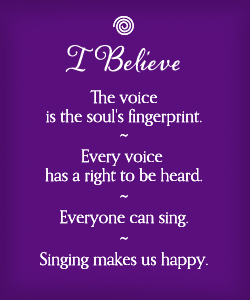 This article appeared in the Concord Monitor on February 4, 2013.
This article appeared in the Concord Monitor on February 4, 2013.
In mid-January, I volunteered to lead a singing workshop at the women’s prison in Goffstown, and five brave inmates joined me. All but one were scared to sing, but, as they said, there was nothing else to do.
I began the workshop as I always do with a very simple song, easy to learn, easy to create endless verses. Very quickly, it was clear that singing out loud, even a fun, little song, was not going to work. It made the women feel too vulnerable. I suggested we try a single syllable instead, “HU,” pronounced “who.” HU is a syllable that clears the energy of the person chanting and the energy in the room.
I told the women that they could sing the sound out loud with me or silently in their head, and it would work either way. We toned HU for three or four minutes.
Afterward, I asked the women how they felt. Their responses: relaxed, centered, calmer, more aware of my self and surroundings; the tension went out of my back; whatever was bothering me was put behind.
Two important facts about singing emerged, making all the difference to the women. First, every cell of every thing on earth, including ourselves, is composed of vibrating energy. When we sing, the vibrating sound brings all the disparate vibrations of our cells into harmonic alignment. Called entrainment, it is the basis of music therapy and our emotional and physical responses to different kinds of music. Singing one clear syllable, HU, with me for about three minutes changed the energy of everyone in that small cafeteria, transforming the place and the people. The immediate positive impact of that sounding was a unique experience for the women. They wanted to know more.
Second, the entrainment effects on the body and mind are the same whether you sing out loud or silently in your head, moving your lips, tongue and mouth as if you are actually singing. The brain functions the same whether the singing is audible or silent. The power of visualization is well-known to athletes and musicians for enhancing their performance.
This fact gave the women permission to try something new, to sing even if they were uncomfortable, intimidated, embarrassed or felt unsafe. They all looked relieved when I told them they could do it in their head and still experience the benefits. The irony was that as soon as they realized they didn’t have to sing out loud, they all began making more sound. They stopped nervously looking at each other and tuned inward to their own experience.
After HU, we sang three other vowels for their specific effects on one’s energy. To change brainwaves and the energetic state of the body, it is best to chant these sounds for at least three to five minutes. Your body will know when to stop.
After chanting an “ee” vowel, the women described their experience as “energized, awake, alert, relief, peaceful, bright eyes.”
After chanting an “ah” vowel, they said they felt “tired, clean, warm, lived in; the vibrations started in my shoulders and went down my spine.”
After sounding “ooh,” they felt “centered, aligned, safe, free, at home, integrated and relaxed.”
These sounds work for everyone: ee for energizing, ah for calming and relaxing, and ooh for centering and focus.
In a 2010 study about mind wandering and happiness, psychologists at Harvard found that the people who said they were the happiest were focused on the present moment. Singing can only be done in the present moment. From children to voice students, amateur choral singers to participants in my Vibrant Voice workshops, people consistently say that singing makes them happy.
I don’t know what these women did to land in prison, but they were young, articulate, nice, polite, eager to learn and scared to sing. At the beginning, one woman sat down with her shoulders hunched and said she carried the weight of the world on her shoulders. She felt silenced by several bad relationships with men and now living in prison. In an hour and a half, she sang silently, then aloud, asked questions and left smiling.
At the end, I asked the women to describe how the workshop made them feel. “Relaxed, relief, aligned, alive, feel better mentally, inner peace.” As she left, another woman said she was surprised by the experience, adding, “It doesn’t take a long time to center.”
I was reminded that we can each choose to be present in whatever circumstances we find ourselves, even prison – whether literal or metaphoric. Singing can take us there, in the present, where we can be centered and happy.
(Peggo Horstmann Hodes of Concord is a singer, performer, voice teacher and conductor of Songweavers at Concord Community Music School. Read more at peggohodes.com/blog.)

What a wonderful experience you had with these women and I had in reading your blog! Thanks fo rsharing.
Nancy Shand
Thank you for sharing. Yes, it was a very powerful experience to work with people who are so real in the moment.